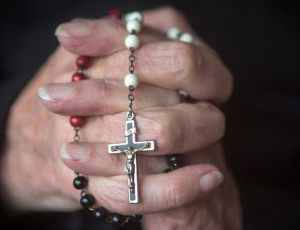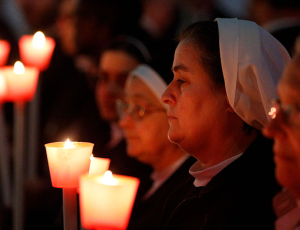The “Christmas Season” in the Catholic Church lasts from Christmas Eve until the Feast of the Baptism of the Lord and includes Christmas; the Feast of the Holy Family of Jesus, Mary and Joseph (December 27, 2020); the Solemnity of Mary, Mother of God (January 1, 2021); the Solemnity of the Epiphany (January 3, 2021); and, finally, the Feast of the Baptism of the Lord (January 10, 2021).
The Feast of the Holy Family of Jesus, Mary and Joseph (December 27, 2020). Although devotion to the Holy Family has been part of the Catholic tradition for centuries, a special feast day to honor the family of the Lord was officially established by Pope Benedict XV in 1921, for the Sunday after the January 6 Feast of the Epiphany. In 1969, the Feast of the Holy Family was moved to the Sunday following Christmas.
The liturgical celebration itself has as its centerpiece Jesus’ human family as a universal model for and within all families. It provides Catholics with an opportunity to pray for their own families and to strengthen the bonds of the ideal family life and love, the “family Church,” as St. John Chrysostom referred to it in the fourth century, and the “domestic Church” as the Second Vatican Council described it in its “Dogmatic Constitution on the Church,” Lumen Gentium, 11.
The feast emphasizes the Lord Jesus as the center of every Christian family. St. Luke’s Gospel proclaims that Jesus “went down with them and came to Nazareth and was obedient to them; and his mother kept all these things in her heart. And Jesus advanced in wisdom and age and favor before God and man (Luke 2:51-52).”
It became customary in Catholic schools in our country to place a cross and the letters “JMJ” in honor of the Holy Family at the top of written pages.
Let us pray: O God, who were pleased to give us the shining example of the Holy Family, graciously grant that we may imitate them in practicing the virtues of family life and in the bonds of charity, and so, in the joy of your house, delight one day in eternal rewards. Through our Lord Jesus Christ, your Son, who lives and reigns with you in the unity of the Holy Spirit, one God, forever and ever. Amen.
The Solemnity of Mary, the Mother of God (January 1, 2021). When Mary visited her cousin Elizabeth, she was greeted as the “Mother of the Lord (Luke 1: 43),” a recognition both of her unique place in God’s holy plan and her faith in accepting his will. For centuries, the Church has honored Mary’s role in the history of salvation. At the words of the angel Gabriel foretelling her divine maternity, Mary replied, “I am the handmaid of the Lord. May it be done to me according to your word (Luke 1: 38).” Her complete faith and trust in God alone made her the channel through which Christ the Messiah entered the world. And, so, the Lord Jesus was born.
In 431, the Church Council of Ephesus declared that Christ is truly divine and that Mary is the Mother of God (theotokos). Many dioceses throughout the world, including Rome, had adopted the January 1 date for commemorating this affirmation of faith over the centuries and, in 1931, Pope Pius XI officially placed the feast of Mary itself on the Church’s universal calendar. Pope St. John XXIII named it “the Octave (eighth day) of the Nativity” in 1960.
In 1969, the Church’s calendar was revised and January 1 was celebrated as “the Solemnity of Mary, the Mother of God.” In his 1974 apostolic letter Marialis Cultus, Pope St. Paul VI wrote that the feast was “meant to commemorate the part played by Mary in this mystery of salvation” and “to exalt the singular dignity which this mystery brings to the Holy Mother … through whom we were found worthy to receive the Author of Life.” The Church was encouraged to use this feast to beg God for “the supreme gift of peace.”
Let us pray: God our Father, may we always profit by the prayers of the Virgin Mother Mary, for you bring us life and salvation through Jesus Christ her Son who lives and reigns with you and the Holy Spirit, one God, for ever and ever. Amen.
The Solemnity of the Epiphany (January 3, 2021). In the earliest centuries of the Church, the “Christmas feasts” occurring after Christmas Day were all celebrated on January 6. By the fourth century, some dioceses began to celebrate the feast of Christmas and the feast of the Epiphany separately, on December 25 and January 6 respectively, creating the “twelve days of Christmas” as the Christmas Season.
The Feast of the Epiphany is associated with the “visit of the Magi” – “Three Wise Men,” sometimes called the “Three Kings” – whom tradition holds followed a star to Bethlehem to worship the newborn Messiah with gifts of “gold, frankincense and myrrh.” The Gospel of Matthew 2: 1-12, however, is the only Gospel to mention the “wise men.” It does not give their number, does not identify them as “kings,” and does not say “when” they visited. The details of this part of the “Christmas story” have been debated by Scripture scholars for centuries but this “visit” has a significant purpose.
The Greek roots of the word “epiphany” mean “manifestation from above.” In the Latin or Western Catholic Church, the Solemnity of the Epiphany refers to the revelation that Jesus is the Son of God, the promised Messiah, visited and adored by the wise men. In the Eastern Catholic Church, the preferred word used to describe the feast is “theophany” or “appearance of God.” While Western and Eastern Catholic traditions sometimes differ in particular details or reference, Christmas or the Nativity of the Lord need both “epiphany” and “theophany” to understand its true meaning and significance. The point of the stories and the traditions that have surrounded its development and interpretation lead us to the conclusion that Jesus, born in Bethlehem, is the long-awaited Divine Messiah, foretold by the Old Testament prophets, revealed as the Son of God, and recognized as such by those who witnessed his presence on earth as the source of human salvation by God.
Let us pray: Heavenly Father, you revealed your Son to the nations by the guidance of a star. Lead us to your glory in heaven by the light of faith. We ask this through our Lord Jesus Christ, your Son, who, lives and reigns with you and the Holy Spirit, one God, forever and ever. Amen.
The Feast of the Baptism of the Lord (January 10, 2021). The Feast of the Baptism of the Lord is the end of the Catholic Church’s Christmas Season. At Christmas, the Church celebrates the human birth of the Lord Christ, the “Word made Flesh,” to Mary in Bethlehem. She is the Mother of God and, so, we honor her with a feast celebrating her maternity. Christ the Lord is made manifest to the nations, represented by the adoring Wise Men, in the Solemnity of the Epiphany. The Feast of the Baptism of the Lord is a “second epiphany” revealing his divinity and mission, the “theophany” highlighted by the Eastern Catholic Church.
Although celebrated within the Christmas liturgical cycle, the event commemorated in this feast is separated from Christ’s Birth in Bethlehem by many years. Jesus is an adult at this point, meeting John the Baptist and submitting himself to John’s baptism in the Jordan River. Here, in dramatic fashion, Jesus is revealed again as the Son of God the Father whose voice could be heard identifying him as such with the Holy Spirit descending upon him in the form of a dove. At his baptism, we witness God’s nature as the Holy Trinity before our very eyes. God made man, plunges into the waters of the Jordan and emerges – the “Beloved Son” – commencing his Divine Mission and his journey to Jerusalem where that Mission would be fulfilled on the Cross. As his baptism completes the true meaning and revelation of Christmas, it is fitting that the Church sees this feast as the completion of the Christmas Season.
Let us pray: Almighty and ever-living God, who, when Christ had been baptized in the River Jordan and as the Holy Spirit descended upon him, solemnly declared him your Beloved Son, grant that your children by adoption, reborn of water and the Holy Spirit, may always be pleasing to you. Through our Lord Jesus Christ, your Son, who, lives and reigns with you in the unity of the Holy Spirit, one God, forever and ever. Amen.




